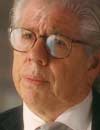- Dan Bartlett
Counselor to President Bush - Carl Bernstein
Reporter - Mark Corallo
Former director of public affairs, Justice Department - Lucy Dalglish
Executive director, The Reporters Committee for Freedom of the Press - Randall Eliason
Former prosecutor - Mark Fainaru-Wada
Reporter, San Francisco Chronicle - Edwin Meese
Former attorney general - William Bradford Reynolds
Former assistant attorney general - Tasia Scolinos
Director of public affairs, Justice Department - Lance Williams
Reporter, San Francisco Chronicle
When we go on the air with this in February, two reporters in San Francisco, for example, are facing jail for reporting a story which the president himself has said was in the national or public interest. That's the BALCO [Bay Area Laboratory Co-Operative] case, the steroids-in-baseball case. Yet they're facing jail because the Justice Department, using its discretion, has decided to try to force them to comply with a grand jury subpoena. Does the administration back that decision?
I don't know the details of that case, and it would not be appropriate for me to comment on an active investigation. But there is generally an important debate that we ought to be having in our country about the ... knowledge of criminal activity ... and the pursuit of a criminal investigation.
But this is playing out in several different cases, not just this one, and I think the courts are going to have to weigh in in this matter.
But the administration has a discretion, through the Justice Department, whether or not to bring certain cases. And I guess in this particular case, the question is, what's the rationale? You're going to shut down reporting on something which everyone says has been to the interests of our public health and to our youth who are involved in sports.
Well, I think that's subjective, to say that it would shut down. These are tough calls. We put very seasoned and experienced prosecutors in these positions, these U.S. attorney positions, to make the tough calls. But ultimately, that's why there's the checks and balances of a court system. The courts will ultimately vet that out.
So we cannot expect the administration to back down on the BALCO case?
Again, I speak only personally for the president. We would not interject from the White House into a criminal prosecution. The U.S. attorneys involved in this have broad discretion to pursue these cases as they see fit.
… Why did you write your affidavit in the BALCO [Bay Area Laboratory Co-Operative steroids] case? What do you think is going on there?
I think that what's going on there is that two reporters did their job -- that is, that they did a hell of a job reporting -- and that [San Francisco Giants'] Barry Bonds, who did not like their reporting, has tried to seek some retribution. The result is that now there is a subpoena out for these two reporters. That's what I think. ...
The reason I signed that affidavit is that ... this is how we come by important information that makes all of us better off by knowing the truth -- that's all I said -- and that this principle of confidentiality is one that we must maintain and that in light of Branzburg, and the fact that we have no absolute right under the Supreme Court decision to claim a privilege, then it is incumbent on prosecutors to make this a matter of last resort. ...
[Why did you submit an affidavit in the BALCO investigation?]
I felt that, personally, this was an abuse of power. ... I felt that in the BALCO case the government just did not meet the standards set by their own guidelines. The Justice Department has very clear guidelines about subpoenaing reporters for sources. This one doesn't even come close. There's no grave national security matter here. There is absolutely no harm to life or limb. The only harm to life or limb comes from the drugs. ...
And these two guys, [San Francisco Chronicle reporters] Mark Fainaru-Wada and Lance Williams, cleaned up baseball. ... I'm a Yankee fan; when you say DiMaggio and Mantle, I genuflect. And the idea that these guys cleaned up a game that I love, that they should be subject to this kind of abuse in a case that was already prosecuted and closed, where you had a defendant who pled guilty and already served his jail time -- ... without that leak, baseball maybe doesn't confront the problem.
These are two gentlemen that the president of the United States called heroes and said did a great service to their country. I agree with that; I think they are heroes. And I think there comes a time when the Justice Department has to look at a case -- a leak case -- and say there's no reason to go forward here; there's no good reason to do this. ...
What's the problem here? Your successor is not a baseball fan?
I don't know. I don't know what's happened here. It seems that there has been a policy shift. It seems that -- the way we operated under Attorney General Ashcroft, where we were absolutely committed to not issuing one of these subpoenas. That seems to have changed. ...
... Let me put myself in the position of a prosecutor who would say, look, there is a rule; it's called 6(e). It says anything that goes on inside a grand jury is supposed to stay in the grand jury. ... These gentlemen got a leak of this information, published it, damaged reputations, presented information that should never be public, and are making money off of it. And one of the people who is named in the grand jury in this case, [the San Francisco Giants'] Barry Bonds, has filed a civil action on this exact point, that his rights have been violated. So we have to investigate. This is what the guidelines were there for. … Rule 6(e) is sacrosanct to prosecutors and to the Justice Department, as well it should be.
But again, there's a bigger picture here, and you have to weigh the damages. ... If grand jury information is leaked, there is going to be some damage. But I would submit that there's a greater damage when you try to haul in a reporter who is just on the receiving end of the information and threaten to put that reporter in jail for protecting a source.
This is not a case where anybody's life is in danger. I think even Mr. Bonds realized that he didn't have a case and has dropped his case. I just think that the Justice Department was way out of line here. ...
… The current attorney general [Alberto Gonzales] has said that while he appreciates and respects the importance of the press [doing] its job, we also can't have a situation where someone who does a terrible crime can't be prosecuted because of information that's in the hands of the reporter.
I absolutely agree, and that's why this is done on a case-by-case basis. But I want their definition of "horrible crime." The guidelines are pretty clear that a horrible crime in these matters has to involve either national security or real physical harm. ...
What is the BALCO case all about?
BALCO, that's also an interesting case. ... The San Francisco Chronicle did some groundbreaking stories about steroid and substance abuse in Major League Baseball. There was a lab out there that they called BALCO, the Bay Area Laboratory Co-Operative. They were under investigation, so the feds have a grand jury investigation; these charges come about. A number of prominent baseball players testify in front of this grand jury. Charges are brought, and along the way, these two reporters for the Chronicle get ahold of some grand jury information. ... The court and the Justice Department were very, very angry that this supposedly secret grand jury information was reported outside of what happened in the trials and the other court hearings.
So they launched an investigation into who the leaker was. This case was going on in San Francisco; they went to the U.S. Attorney's Office in Los Angeles to try to identify who the leakers are, and they have subpoenaed the reporters from the San Francisco Chronicle to find out who apparently or may have violated a court order by releasing the grand jury information. ...
... Why should reporters have the right to publish secret grand jury testimony? Doesn't that interfere with the government's ability a, to conduct an impartial investigation, and b, to protect people who have not been charged with wrongdoing?
I think there are a number of people out there who would say yes, and in many cases, when media find out about grand jury investigations, they do sit on information quite a bit. There's a lot of information reporters get that is not reported.
However, in the BALCO case, I think the news organization made a very careful decision about an event and events, about a very important news story. The use of steroids and other substances in major league sports is a very, very big, national problem. Children look up to these folks and get the idea that if they are big and strong, maybe they can make it as a major league ballplayer as well.
I understand it's a worthwhile story.
It's a worthwhile story.
... But still, this is the United States of America. The grand jury is in the Constitution. It's an institution that requires secrecy, and people will not testify freely before a grand jury if they know that the transcript will get leaked.
I suppose that's possible that some of them won't. ... It's illegal for only a handful of people to reveal what happened in front of a grand jury. If you're on the grand jury, you're not supposed to reveal it. If you were one of the lawyers or one of the parties, you're not supposed to reveal it.
But you, as a citizen, if you are called before a grand jury to testify, you may go out the next day and tell anybody in the world what you said and what the case was about. There's no law that prevents that. ...
I think it's important to note that in these grand jury cases we just talked about, Taricani and BALCO, one thing that you worry about with the leak of grand jury testimony is that you're not going to be able to pursue the case, or that someone will not get a fair trial or there's no prejudicial pretrial publicity, and there are all of those interests. That's why the law provides for grand jury secrecy.
I think it's important to point out that in both the Taricani case in Rhode Island and in the BALCO case in San Francisco, these folks have already been convicted or pled guilty or are already serving their jail time. Justice was done. The cases themselves were not jeopardized, which I think is the strongest argument a prosecutor has. If this information gets out, we're not going be able to see justice done here. ...
So does the BALCO case indicate that the government, the Justice Department in particular, is no longer abiding by its old guidelines?
I don't think I could conclude that. They claim that in this case they did follow the guidelines. Even during the Clinton years, with [Attorney General] Janet Reno, we've always had a certain number of subpoenas come out. So I guess I would take them at their word when they said that they used the guidelines and exhausted them. ...
I want to go on to BALCO [Bay Area Laboratory Co-Operative]: ... If you're a casual observer, ... you might see reporters who are exposing corruption, drug use in baseball, who are facing jail, [and] baseball players who are doing the drugs are rich; they're not being punished at all.
The athletes were testifying in a grand jury, again, under a guarantee of grand jury secrecy. Now, it's not an absolute guarantee, because they know if they have to testify at trial, of course, then ultimately the secrecy is going to go away then. ... But they do know at least when they go in and testify that their privacy is protected. The leaks that were made to the reporters then sort of took away those rights, exposed the athletes to a lot of public scrutiny, the congressional hearings and a great deal of reporting and stories about their activities. Now, their activities were wrong, using illegal steroids, and so you can say that's a good thing as well.
But the fact is, grand jury secrecy exists for a reason. It protects the privacy of people who might be under investigation but end up not being charged. So their reputation, their name is not put out there as possibly having done something wrong if they end up not being charged at all. It protects witnesses who might be fearful about it being known that they have cooperated in a case. And so it allows that to remain secret.
The BALCO investigation now is about more than just a grand jury leak, because the information was leaked in violation of a federal judge's order. Everybody involved in the case then came in and denied doing it, so someone may have committed perjury. And there's a suspicion that the defense may have been involved in the leak and then turned around and tried to get their case dismissed by blaming the government. So that would be a possible obstruction of justice or contempt or other charges. So there's a lot more going on than simply a leak of grand jury information. ...
We talked to Mark Corallo, formerly with the DOJ under Attorney General [John] Ashcroft. He calls this case an abuse of power; he says the DOJ under General [Alberto] Gonzalez has basically violated the [DOJ] guidelines. Is that valid?
Well, I'm not sure how Mr. Corallo could say that without having access to the grand jury information. ... It's pretty hard to make a judgment of whether the guidelines have been violated when you don't have the information as to what's being investigated and what's going on. So that's not entitled to much weight in my mind.
He told us, in the DOJ guidelines, that only under "exigent circumstances" should journalists be pursued, and he said that "exigent" was defined ... as emergencies, life and death, real national security threats, a situation where a leak caused a terrorist organization to be tipped off as to where the feds were. ...
Yeah. I think there's some disagreement about what that term "exigent" means within those guidelines. I've seen other interpretations of it as well. He's entitled to his view. But again, I think without knowing everything that the government is looking at in this investigation and everything that's going on in the grand jury, it's awfully hard for someone on the outside to make a judgment about whether or not the guidelines have been complied with.
The other thing that's important to keep in mind here as well is a federal judge asked the government to look into this. This isn't something that the prosecutors have just gone out on their own. ... When a federal judge asks you to investigate why their orders were violated, you have to take it seriously.
I'm going to read to you another quote from another interview. This is with one of the [San Francisco Chronicle] reporters, Mark Fainaru-Wada. He said that "without the names, the stories don't resonate. I mean, without the names, you have the indictments talking about four guys who nobody's ever heard of or cares about, dealing performance-enhancing drugs to a bunch of athletes that are not identified." ...
Well, an indictment is not a press release, you know? It's not the job of an indictment to make all this information public. The job is to file specific criminal charges, and I think there were very good reasons that the athletes weren't named in that indictment, primarily to prevent exactly what happened once their names were exposed. Once their names became known, there was this tremendous amount of publicity, and the criminal defendants all of a sudden came into court and said: "We can't get a fair trial. Look at all this flurry of attention now. Everybody thinks we're evil, and we can't possibly get a fair trial. You should dismiss the case." ...
Much is made of the irony in this case that President Bush apparently commended these reporters themselves for having done a vital public service. If the public good was served, why do these reporters deserve to go to jail?
That's sort of an "ends justifies the means" argument; in other words, no matter how many laws were violated or how much the federal judge's order was defied, it's OK, because we have this really important story. Writing the story is not the only interest at stake here. There were interests in these criminal defendants in getting a fair trial and interests in a federal judge's orders being complied with. …
I think you can grant that there's some public good that came from the reporting, but remember, there was a lot of reporting that they did on this story that did not involve leaked grand jury information. But now we're not talking about the reporting and the steroids story anymore. Now we're talking about the ability to investigate somebody who may have committed perjury, obstruction of justice, violated a court order by giving information to a journalist illegally. ...
[San Francisco Chronicle reporter] Lance Williams said: "I respect the court system, and I'll comply with their wishes in every way possible. But I am being asked to -- not asked, told to betray not only sources, but betray ideals that I've held for over 30 years as a reporter. And I'm also being asked to give up my career, because don't kid yourself: If they bully me into betraying my sources, I can't work anymore."
Well, I think it's an interesting notion in journalism that the professional ethics and standards require them to violate the law. No one in our country has a right to decide themselves what the law requires. I know journalists feel very strongly that they need this privilege in order to do their jobs. Congress hasn't agreed, and the Supreme Court hasn't agreed, so journalists have no more right than any other witness to say, "I'm just not going to testify, no matter what you say." ...
You were a sports reporter for quite a while?
Right. I was a sportswriter pretty much all my career in journalism, up until August of 2003, about a month before the BALCO [Bay Area Laboratory Co-Operative] scandal broke.
[San Francisco Giants'] Barry Bonds, as you guys point out in your book, had gained, what, 15 pounds of muscle in 100 days and transformed into an NFL linebacker. Why didn't other people write about this? What was so difficult to report?
I think the story was hard for a lot of people. First of all, a lot of sports reporters in particular, and really reporters in general, were not educated about the notion of steroids. ... You had the 1988 scandal in which [sprinter] Ben Johnson is exposed when he breaks the world record at the Seoul Olympics, but he's a Canadian. ... You have the East German legendary doping scandal of the '70s and '80s. But for American sportswriters, the story didn't really resonate. ...
The other part of it was, it's a hard story to sort of wrap your arms around. People say, why didn't you write about [St. Louis Cardinals'] Mark McGwire using in 1998, for example? If people had tried to do the McGwire [story] in '98, you would have ended up with three or four anonymous sources telling you that McGwire had been using, and that story probably wouldn't have got in the paper. And if it did, it wouldn't have resonated with fans. ...
Wasn't there a lot of backlash against reporters who tried to cover the story?
Absolutely. For example, in '98, there's an AP sportswriter named Steve Wilstein who discovers a bottle of andro [androstenedione] in Mark McGwire's locker. Andro is a now-banned supplement that acts like a steroid, really. When Wilstein discovered this in McGwire's locker, there was no backlash on McGwire; the backlash actually was on Wilstein. Tony LaRussa, then the manager [of the Cardinals], lashed out at Wilstein, wanted to try and get the AP banned from the clubhouse, it was so bad. ...
So what changed?
Well, BALCO changed a lot of things, clearly. The biggest benefit for us and anybody else reporting the story was that you had a federal investigation. ... You saw athletes walking into a federal building to testify before a grand jury. ... It created any number of sources who knew what was going on: ... the feds themselves, lawyers, athletes, owners. ... It was a window into this world of performance-enhancing drugs that you couldn't have gotten into otherwise.
So how do you and [co-author] Lance [Williams] get assigned to this [story]?
I was the first one assigned. In September of '03, there was a raid on BALCO, this little-known lab at the time. ... No one had ever heard of the lab. I mean, it was just a random lab that sold supplements. ... I had just moved out of sports and into our investigative team. ... The IRS was the lead agency in that raid, so we thought it could just be a money place. But when you went to the Web site for BALCO, you saw all these famous athletes that were part of the company, or that were at least doing business with the company. Barry Bonds was the most prominent, but [sprinter] Marion Jones, [sprinter] Tim Montgomery, [NFL linebacker] Bill Romanowski. ...
So at that point, the interest got ratcheted up. I was assigned to try to figure out what was going on. We broke about three stories or so within a month: found out that there was a steroid investigation; found out that Bonds had been subpoenaed; found out they'd found steroids when they raided the place. ... It became clear the story was getting bigger, ... so Lance joined me, and we've basically been together on the story ever since.
And you went through what, 200 interviews a year, thousands of documents?
At least. We tried to be conservative on that when we talked about it, but we spent three years reporting the story, essentially, and still are reporting it to this day.
How important was the grand jury testimony? …
I think it was critical in many ways. ... What the grand jury stories did was actually put a face to the use of drugs. They were admissions by the athletes themselves, who in many cases had come out of the grand jury [and] denied they'd ever used the drugs to the public, but in fact had actually told the grand jury they had used the drugs. ...
And the fact that you made the grand jury testimony public, didn't that put the government in a position of, for example, with Barry Bonds, having to really look at him for perjury, look for other charges?
I don't know what is inside the government's head, ... but I would suggest that from the mome
![News War [site home page]](../art/p_title.gif)













